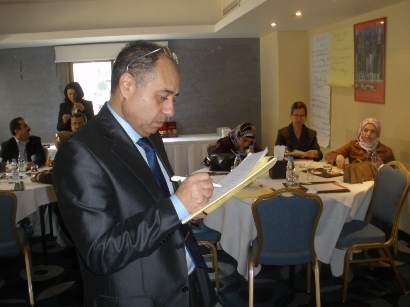
|
| City representatives from the MENA region discuss community participation at a CDS workshop in Beirut |
By Aafrin Kidwai in Washington DC
[2 March 2012] -- In the midst of the ongoing pro-democracy movement in many countries across the Middle East and North Africa (MENA) region, local government representatives gathered in Beirut, Lebanon to discuss a pertinent issue: community participation in urban development.
The occasion was a regional knowledge exchange workshop organised by the Cities Alliance as part of the Jordan – Secondary Cities Development Strategy (CDS) Program. The Hashemite Kingdom, which has successfully implemented the CDS in its capital city Amman, is in the process of CDS implementation in four secondary cities with high levels of poverty and unemployment: Karak, Mafraq, Zarqa and Tafilah.
In the past, the Cities Alliance has supported CDS implementation in the largest cities of the MENA region and has now turned its attention to secondary cities. These cities are undergoing rapid urbanisation but lack sufficient resources and local capacity to manage the process in a sustainable manner. The Beirut workshop was aimed at promoting information exchange among government representatives who have successfully implemented the CDS in their own secondary cities, namely Sfax (Tunisia), Tripoli (Lebanon) and the four Jordanian cities.
Community participation is a key feature of the CDS process supported by the Cities Alliance. Residents are encouraged to participate in the process of shaping a development strategy for their city and subsequently monitor the government’s progress in achieving it. In a region like MENA where democracy remains elusive, it is significant that government representatives engaged in a lively discussion on ensuring the participation of community groups who have normally been excluded from the CDS consultation process. UN-Habitat’s Chief of Shelter Branch and Algeria’s former Housing Minister Farouk Tebbal, who was present at the workshop, says, “Participants went through detailed presentations of different city experiences and engaged in lively, open, straightforward and intense debates. They addressed issues that some cities are facing and how these have been dealt with by other cities.”
Apart from community participation, other questions raised by the government representatives dealt with how city leaders can build stakeholder trust and confidence in the CDS process to create a lasting impact. Another interesting conversation centered on institutionalising the CDS process at the country level. Overall, the workshop helped reinforce the CDS strategising process and provided new inputs as the Jordanian cities embark on a second CDS phase (which includes a validation phase and dissemination of the action plans).
The Jordan – Secondary Cities Development Strategy (CDS) Program has been funded by the Cities Alliance since 2010. It is the second step in a programmatic approach to assisting the four secondary cities in the CDS development process. Nearing completion, one of the key objectives of the Program is to build the capacity of Jordan’s largest municipalities and generate local economic development opportunities outside of the nation’s capital, Amman, in cities which include the highest poverty rates. The Beirut workshop was organised by The World Bank’s MENA region in partnership with the four Jordanian municipalities with the support of Centre for Mediterranean Integration and the Cities Alliance.




